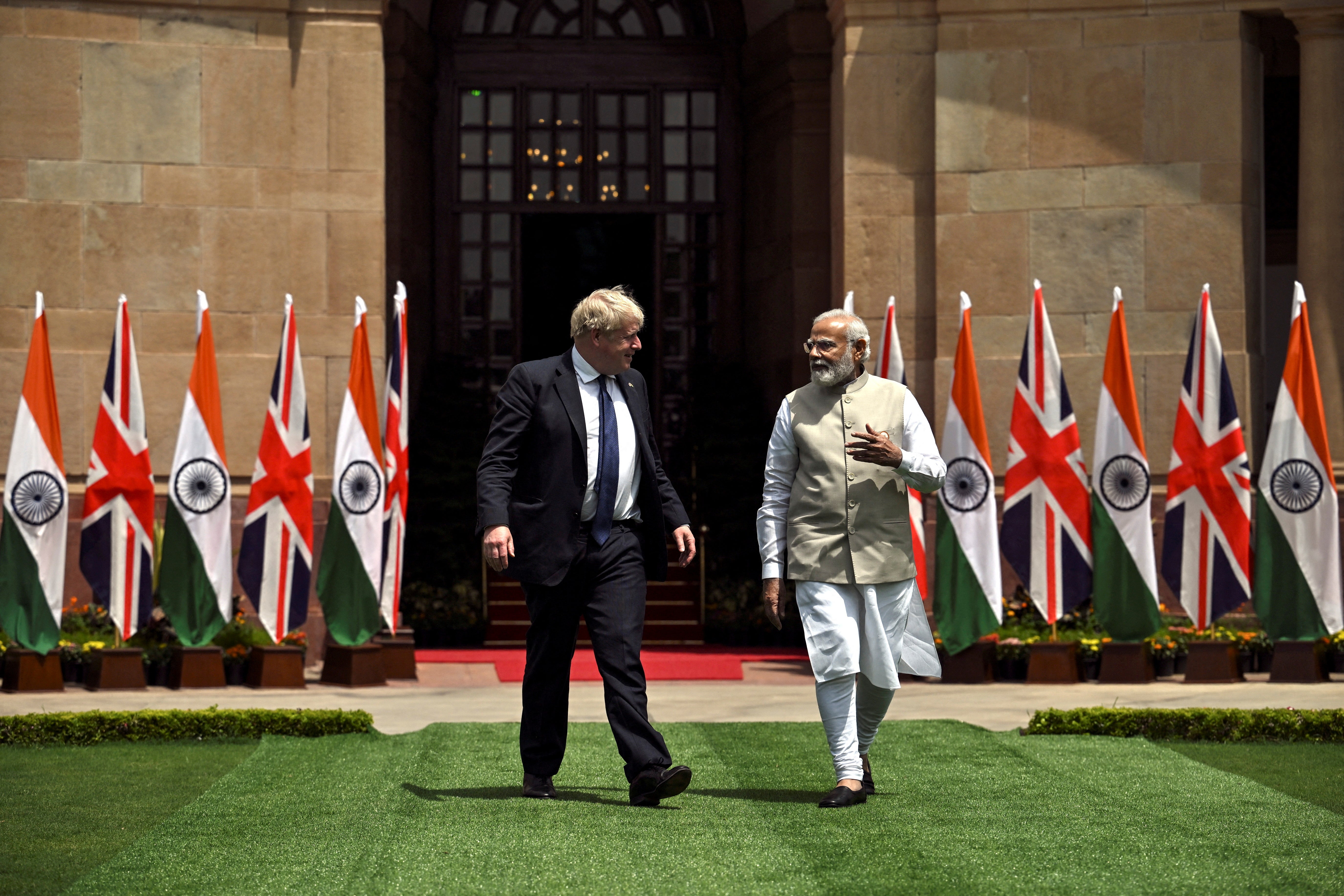The brutal truth is that Britain needs a trade deal much more than India does
Editorial: Boris Johnson, clowning aside, needed to be on his best behaviour with his hosts

The “optics” of the prime minister’s visit to India were not good. The ritual welcomes made Boris Johnson look like a hapless, bumbling tourist. They only served to remind his critics back home that his willingness to appear gurning away in a “funny” photograph far exceeds his ability to tell the truth about darker matters.
As ever, his play-acting amounted to a mild satire on the culture of the host nation. His closing press conference – handled alone because Narendra Modi dislikes unscripted, spontaneous appearances before the media – wasn’t a rip-roaring success, either. Dominated by questions about his own future, he looked shifty and on edge, as well he might when even his own MPs want him investigated for lying to parliament.
Away from the buffoonery, though, there was important work to do, and some of it got done. The prime minister tried to persuade the Indian prime minister to loosen his country’s economic and security ties with Russia, and persuade Vladimir Putin to end his cruel and illegal war in Ukraine.
India has taken a studiedly neutral stance on the invasion, one that is increasingly unsustainable as the evidence of war crimes mounts up, and as Russia openly and casually announces an ambition to occupy the whole of southern Ukraine and the breakaway Transnistria region of Moldova.
Thus, a second sovereign state, and member of the United Nations, is set to be invaded by Russia. Even the most loyal Kremlinite couldn’t paint little Moldova as an existential Nazi threat to the Russian Federation.
According to Mr Johnson, Mr Modi, while quiet in public (and absent for the journalists) is blunt with President Putin in private and had “intervened several times with Vladimir Putin to ask him what on earth he thinks he’s doing”.
That doesn’t sound quite like the Modi modus operandi, but it’s worth hoping it’s true. Indian purchases of Russian natural resources and armaments are helping to fund the Russian war machine and break the international sanctions on Russia. Perhaps Mr Johnson should have asked Mr Modi what on earth he, Mr Modi, thinks he’s doing.
Geopolitically, Britain also wants India to join with the US, Japan, Australia, South Korea and the Association of South East Asian (Asean) powers in restraining Chinese territorial and economic ambitions in the Indo-Pacific region.
Here again, though, India remains cautious, despite a long-standing rivalry, and the occasional small war, with China. Mr Johnson is effectively asking India to alienate itself from the pair of nuclear superpowers to the north, in return for some British defence know-how. That deal may need some further work.
Mr Johnson, clowning aside, needed to be on his best behaviour with his hosts, because he is desperate for a trade deal with India, one of the most protectionist large economies in the world. The brutal truth is that Britain needs this much more than India does, and is in a weak bargaining position.
India’s fast-growing GDP is about three or four times that of the UK, and Britain, burdened with low productivity and sluggish growth, has a large and increasing trade deficit with India.
India doesn’t want or need that much from Britain, compared with the vastly larger markets of America or the EU, and is wary of opening up access to its notoriously bureaucratic markets. However, India has long sought many more visas for younger Indians to come to Britain to study and work.
Resistance to this ambition was why Theresa May’s government got nowhere in its trade talks, but Mr Johnson sounds more accommodating. His only feeble condition is that the British be allowed to manage the process in some way: “I’m not going to be dogmatic in refusing people with skill and talent in coming to the UK. All I would say is we need to control it.”
In return, India will be willing to buy more scotch and JCBs. Even so, Britain will still export less to India than it does to Belgium.
There is a great irony that, having rejected freedom of movement as the price of easy and complete access to European markets, Mr Johnson is having to accept freedom of movement of Indian nationals to live and work in the UK as the price of some modest reductions in tariffs and barriers to trade and investment in India.
Given that unfounded generalised fear of all immigration was such a driver of the Leave vote in the 2016 Brexit referendum, Mr Johnson’s more antediluvian critics in his own party might well ask him “what on earth he thinks he’s doing”.






Join our commenting forum
Join thought-provoking conversations, follow other Independent readers and see their replies
Comments